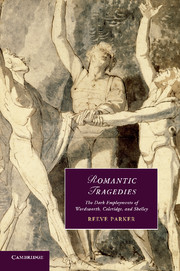Book contents
- Frontmatter
- Contents
- List of illustrations
- Acknowledgments
- Introduction: “Prowling out for dark employments”
- PART I WORDSWORTH
- CHAPTER 1 Reading Wordsworth's power: narrative and usurpation in The Borderers
- CHAPTER 2 Cradling French Macbeth: managing the art of second-hand Shakespeare
- CHAPTER 3 “In some sort seeing with my proper eyes”: Wordsworth and the spectacles of Paris
- CHAPTER 4 Drinking up whole rivers: facing Wordsworth's watery discourse
- PART II COLERIDGE AND SHELLEY
- Notes
- Bibliography
- Index
- CAMBRIDGE STUDIES IN ROMANTICISM
CHAPTER 3 - “In some sort seeing with my proper eyes”: Wordsworth and the spectacles of Paris
Published online by Cambridge University Press: 05 May 2014
- Frontmatter
- Contents
- List of illustrations
- Acknowledgments
- Introduction: “Prowling out for dark employments”
- PART I WORDSWORTH
- CHAPTER 1 Reading Wordsworth's power: narrative and usurpation in The Borderers
- CHAPTER 2 Cradling French Macbeth: managing the art of second-hand Shakespeare
- CHAPTER 3 “In some sort seeing with my proper eyes”: Wordsworth and the spectacles of Paris
- CHAPTER 4 Drinking up whole rivers: facing Wordsworth's watery discourse
- PART II COLERIDGE AND SHELLEY
- Notes
- Bibliography
- Index
- CAMBRIDGE STUDIES IN ROMANTICISM
Summary
If it's plausible Wordsworth was in the audience on November 1, 1792, at the Théâtre de la République's final performance of Macbeth, is it likely he would have missed the much anticipated première performance later that month, on the evening of November 26, at the same theater, of Ducis's Othello? (Like Macbeth, the play had been originally accepted, in 1788, by the Comédie-Française.) In the title role – again – was Talma, whose meteoric career, like that of his older friend the painter David, in many ways should be read through Revolutionary spectacles. Six weeks after the mid-October Dumouriez evening at the Talmas and Marat's alarming attack in the Journal de la République, the notably anti-aristocrat, pro-republican adaptation of Othello may have served as a piece of timely Revolutionary rhetoric by Talma's acting company at the République. Given the continuing ascendancy of Robespierre's Jacobin politics, it would have manifested the republican bona fides not only of the author and the leading actor but also, perhaps, of General Dumouriez himself, as one might imagine him reflected in the military heroics of Ducis's Othello. For a young English republican much attuned to the politics of the day, publicity in mid-November surrounding the potentially controversial political aspects of French Othello may well have drawn him all the more to that République opening.
- Type
- Chapter
- Information
- Romantic TragediesThe Dark Employments of Wordsworth, Coleridge, and Shelley, pp. 62 - 78Publisher: Cambridge University PressPrint publication year: 2011

